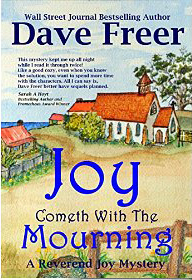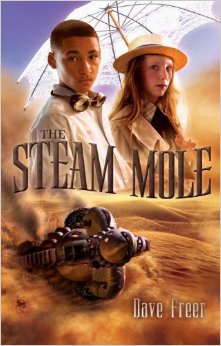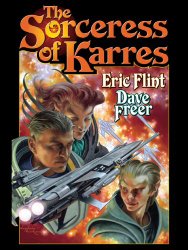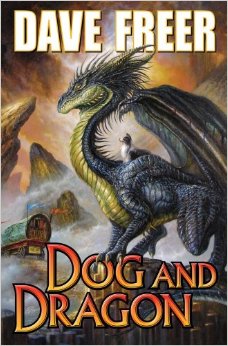Today we have a superb guest post by author Dave Freer.
Before I post it, however, I have some terrific news. There is now a Superversive website! It is Superversive SF, and will be posting both superversive and science posts. The site is run by Mr. Jason Rennie of SCI PHI. He is looking for posts and book reviews. So, if you wish to write a post or a book review, or you see an article you think fans of Superversive SF would be interested in, let him know! (Or let me know, and I'll let him know. ;-)
This column is also going to appear there. I am going to experiment with having the comment link lead over there.
Again, that's: SuperversiveSF.com
And now, without further ado:
Makers and Breakers
by Dave Freer
You an find this book on Amazon here.
Now of course you want to take anything I say with a whole shovel of salt, because, according to the self-selected arbiters of modern standards, I’m barking insane.
As sanity is a relative concept (take some of my relatives. Please), salt is great preservative, and if I’d rather not be judged sane by their standards, this is all good.
Of course they don’t like you listening to me or reading my folly, but that is, as they say, is hard cheese…
Which brings me around to what I was going to write about.
“‘Hard cheese?’ maybe he is mad after all,” I hear you mutter.
Well, maybe. But what you have to grasp about hard cheese is that, as opposed to milk, or even soft cheese, hard cheese was made as a way to keep food for the long, dark winter months. To store against a possible bleak year and poor harvest.
Making hard cheeses is the opposite of instant gratification. It’s not easy or quick (soft cheeses are, even if you don’t nip off to the shops and buy some cream cheese).
Cheese these days comes from the supermarket… unless of course you’re a nutter like me.
I make cheese. I make bacon. I make salami. I make hams. I make jerky… I preserve, dry, or freeze everything that doesn’t run fast enough to get away.
Part of this is choice and part of this choice-inflicted. I live on a remote island, a once a week ten hour ferry trip off the coast of Australia. Actually, yes, I can buy anything you can in urban America. I can even buy today’s newspapers, as long as I only go and collect them tomorrow. It is just very expensive to do so, and if there is bad weather (and this is the ‘roaring forties’ of sail-ship legend) there is a chance that tomorrow may be somewhat delayed (it’s not quite like mañana. It eventually does come). It does force you to change the way you live, and how you see the world. To plan, to build up stocks and to think ahead. And of course, to delay gratification. It also changes the way you look at that now much maligned and derided hero of yesteryear, the pioneer, the colonist, and those who built on that legacy, so someone urban lout who never got up at half-past predawn to milk, could whinge about government cheese. The farmer, the guy getting a sloppy-with-somewhat-processed-grass tail whipped across his face, the fellow squatting planting seeds he kept from last year, the fisherman on a wild and rolling sea… these are my people, my heroes and my role models. These are the builders, the makers. These are the foundation stone people on which my Australia and the US and Canada (yes there are others, but at least I know a little about those) were built, and still actually stand.
Not surprisingly they tend to see the world very differently from those who are sheltered from these things in the raw, and completely differently from the takers and breakers.
They tend to be pragmatic, to think ahead, to think for themselves, which seems to mean conservative these days (bizarre, isn’t it, how words change meanings. Once that was what one meant by liberal. It still does in some English speaking places.). They value things that they can see have worked (for their parents, grandparents, and more), and do still work. They’ve learned the hard way of the value of hard labor, of honesty, of good neighbors and of a real ‘community’ (not the stolen use of the word that politicians like to burble about).
These are people who know each other, who turn up to fight fires or clean gutters for the old people, because they know, like and respect them. Church is still important, and so is earned respect, appearances, less so. You know people for what they are and do, not for what they look like, and what labels they stick on themselves.
It’s not always an easy way to live, which is one reason why cities draw. The other is that cities offer a great deal… of employment, entertainment, choices and also fast food.
No, I don’t want everyone to live like we do.
If everyone did it, it would be harder going for a hunter-gatherer-farmer like me.
I might have to rely on my writing to put food on the table for my family, And there’d be No-one to make computers, so you’d best all stick to making computers or mining or writing programs, from my point of view, anyway. That’s also making.
But it is much easier to become distant from it. To not see the gulf between making and taking, between building and looting what others build. Although I work the land and sea much as my ancestors did, and with the same attitude – if a piece of machinery made it possible to do it better and faster — I’ll try it, I am two other things (well, yes, actually many. A man is a complex thing) firstly, by background, a scientist who likes logic and numbers, and secondly, a lifelong reader.
And it was books, and identifying a trend in them that I found, well, was making them less pleasurable, that got me writing.
Observation said that there were less books with heroes I could identify with.
Logic said something about them had to be bothering me. It took me some time to work out what it was, because it was counter-intuitive to me.
The center of the books had shifted over the years. Steadily, to the point where it was now bothering my logic and suspension of disbelief, as well as my enjoyment. Fiction is not a how-to manual or even necessarily plausible, as long as it is enjoyable. When it starts to fail the latter part… well, we start to question the first parts.
I realized that the makers, without stopping being the cornerstone of real society, had somehow gone from being mostly the heroes, to inevitably the villains. Somehow we’d gone from FARMER IN THE SKY to only books where humans (particularly white male, Western, heterosexual middle aged ‘country’ people/or those making things) were always villains.
The heroes, weren’t building, they were breaking. And if anything at all, they were striving for or defending the ‘utopia’ we’d narrowly escaped and discovered the horrors of, barely decades ago. Or, possibly worse, humans could be some kind of hedonistic parasite… but making, colonizing, exploring and taming were now evil as were the people (always the same villains) who even thought of such things. They weren’t just evil, they were core-rotten. There was no good in them at all.
Now, of course, I approach this from my own philosophical and religious perspective: While I accept the reality of evil, and that some people can be so corrupted by it that there is little good left in them, I start from the position that humans are made in God’s image. However you take that, it means they start pretty good.
Rotten genes, and bad rearing, and a lousy moral environment can create some very nasty products from that – but not inevitably.
People (or perhaps something more than people) have surprised me over and over. There is still an amazing capacity to do good within just ordinary people, and the capacity of individuals to be that, despite the worst, is something we should celebrate.
Acts of kindness, altruism, generosity, idealism, are not rare. I’ve broken down in areas of South Africa where that is apparently a death warrant… and yet met nothing but kindness and help.
Does that mean I’m some stupid rose-tinted spectacle American Liberal, thinking we can all sing Kumbaya and get on? Not hardly. I’m a pragmatic country-man. I realize that breakers and takers are there too. I just think there are actually more makers than one realizes… but we’re not very noisy and not very busy crawling into the control-spots.
And one of those control spots is fiction.
Fiction is, of course, terribly effective propaganda – but like all propaganda, fails once the target audience is aware it is being manipulated and thus takes the opposite point of view.
What’s more, once they realize it is propaganda, they’re quite likely to dislike the vessel – the story – as well as the ‘message’.
Now I freely admit I started submitting writing (with no delusions that I was a particularly good writer) but with a “I’ve got to be able to do a bit better than this, even if I’m no Heinlein,” look at what was coming out of publishing.
I didn’t realize that those on the levers of publishing didn’t want Heinlein, with ‘makers’. They wanted to break everything that it stood for. If you sneaked it through, you had to clothe it in heavy disguise. I foolishly thought that publishing was long-sighted and logical, and not willing to act against their finest, their foundations, out of short-sighted partisan self-interest.
I thought that there was just a shortage of the kind of heroes I admired, aspired to be like and enjoyed reading about because authors weren’t providing it. Yes, not very bright for a man prides himself on logic.
But it was just so stupid, I didn’t think anyone would do that.
I did figure it out, though. I did then try some stealth, but I am not good enough at it.
And then I was lucky and tried Baen who were still publishing the old kind of Science Fiction.
The trouble, as I see it anyway, is that fiction as propaganda can only work well, long term, when there is a lot of non-propaganda for it to swim amongst, and pass as. So by trying to make the whole field your tool, you must do it so badly that either you prevent the reader from being able to suspend his disbelief (and kill your market, outside the converted), or you convince them to believe falsehoods which may be in your personal short-term interest, but are going to cause devastating long term and collateral damage.
For example: Your teen daughter who reads sf/fantasy is making her first long distance drive home from college. Her car breaks down one night in the middle of nowhere. Two guys stop and decide to grab her and rape her (look at the stats to see who they’re likely to be).
Guns are bad, according to the books she’s read, so she can’t shoot them dead.
Does she, like the feminist heroes of her books – beat them to ground, or maybe just shame them into checking their privilege on twitter? Or, having slightly more brain than cheddar (it’s all about cheese) run to the house across the field – which, given the location is certain to be occupied by the arch-villain of her books, the middle-aged white farmer, who has a wife and three kids, is a church-going Christian, who votes Republican and thinks an Agricultural fair with a rodeo is the best thing ever… and probably keeps a shotgun behind the door and can throw an 80 pound hay bale into the loft sixteen feet up.
The crime stats (the facts, not the fiction) show that he’s her best possible help: not only will he help her, and fix her car, and his wife will feed her and look after her, but he’s almost the single most likely person to physically deal with or to shoot the two varmints, if they decide to try come and get her.
Yes there is a remote chance that he’s some backwoods Hannibal Lector. But the probability is so microscopically slim as to be wearing a dress size minus 24 000 000, which is still too big for it.
But what is she going to believe, if the propaganda has worked? Which is why I started writing books that might be fantasy or sf… but took reality and logic back to where they belonged. That took makers, builders, colonists back to the heart of the story as what they really are a lot of the time: human, fallible and foolish sometimes, but with the characteristics that make the real people.
Pushing that envelope just a bit further I’ve just written a ‘cozy’ Who-dunnit, JOY COMETH WITH THE MOURNING. Set in a small country village in my home, Australia, with the ‘detective’ the person I could think of fitting in with most difficulty there – a timid, urban lady-priest. The point was to write a good murder mystery… with anti-propaganda. With current sneered at villains – ordinary people making lives for themselves and food for others, people as real, and human as I could make them.
With the warmth that they really have. I’m not trying to pretend there are no villains, and no evil.
It’s just not where they claim it is.
We OWN the high ground. We made it. It’s time to stop conceding it. I’m sure some of you can do this far better than I can.
And we can, now.
Let’s do it.
Dave Freer's blog on writing, politics, and philosophy.
https://coalfiredcuttlefish.wordpress.com/
http://flindersfreer.blogspot.com.au/ blog on the self-sufficiency on the Island
More books by David Freer (click on the cover picture to learn more):








